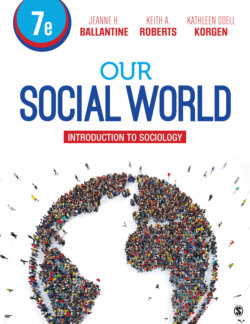Читать книгу Our Social World - Kathleen Odell Korgen - Страница 113
На сайте Литреса книга снята с продажи.
Hunter-Gatherer Societies.
ОглавлениеIn the Kalahari Desert of southwestern Africa live hunter-gatherers known as the !Kung. (The ! is pronounced with a click of the tongue.) The !Kung live a nomadic life, moving from one place to another as food supplies become available or are used up. As a result, they carry few personal possessions and live in temporary huts, settling around water holes for a few months at a time. Settlements are small, rarely more than 20 to 50 people, for food supplies are not plentiful enough to support large, permanent populations (Lee 1984). !Kung women gather edible plants and nuts, while !Kung men hunt. Beyond division of labor by gender and age, however, there are few differences in roles or status.
In hunter-gatherer societies, people rely on the vegetation and animals occurring naturally in their habitat to sustain life. Generally, life is organized around kinship ties and reciprocity—that is, mutual assistance—for the well-being of the whole community. When a large animal is killed, people gather from a wide area to share in the bounty, and great care is taken to ensure that the meat is distributed fairly. Resources are shared among the people, but sharing is regulated by a complex system of mutual obligations. A visitor who eats food at another’s hearth is expected to repay that hospitality in the future.
The !Kung are a typical hunter-gatherer society. People make their clothing, shelter, and tools from available materials or obtain goods through trade with other nearby groups. People migrate seasonally to new food sources. Population size remains small because the number of births and deaths in the society are balanced.
▲ Hunting and gathering societies, like these Botswana Bushmen, do still exist, but they are increasingly affected by modern societies and technologies. These hunters make notes of their most recent excursion on a GPS app on their smartphone.
© Getty/Eric VANDEVILLE/Contributor
From the beginning of human experience until recently, hunting and gathering (or foraging) were the sole means of sustaining life. These early humans developed cultures and skills necessary for survival. Although few hunting and gathering societies exist in today’s crowded and modernizing world, we can learn some interesting aspects about the relationship between culture and human skills from those that do exist. For example, studies of the hunting-gathering group the Semaq Beri of the Malay Peninsula indicate that they have developed superior smell and recognition of scents, in part because identifying odors is key to their culture and survival (Klein 2018).
Other types of societies emerged only recently. Today, only a handful of societies still rely on hunting and gathering (Nolan and Lenski 2014). The hunter-gatherer lifestyle is becoming extinct largely because no society is isolated in today’s world.
